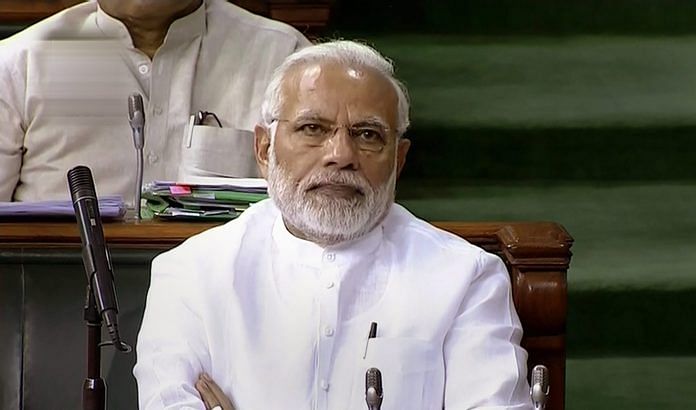Expectations were rife from the Budget presented by Finance Minister Nirmala Sitharaman about announcements of break-through reforms particularly for the farm sector that has suffered immensely in the last few years.
Alas, the speech sparingly mentioned the sector, let alone announce any big-ticket reforms. In fact, unlike earlier Budget speeches, this one did not even have a section on agriculture as it was subsumed under the larger head of “Grameen Bharat”.
I list some key announcements and some disappointments.
Also read: What is Zero-budget farming – Nirmala Sitharaman’s fix to double farm income
Key announcements
Although between the lines, the dream of doubling farmers’ income by 2022-23 was reiterated. A new farmer pension scheme called Pradhan Mantri Kisan Pension Yojana worth Rs 900 crores was announced. To promote and deepen markets, creation of 10,000 new farmer producer organisations (FPOs) was envisaged, and passing reference was made to the role of e-NAM and APMC in that regard. Fishery sector was given a thrust as the speech proposed to create value-chains and infrastructure. Return to zero-budget traditional farming was emphasised.
One of the more progressive announcements were the cluster-based scheme SFURTI (Scheme of Fund for Upgradation and Regeneration of Traditional Industries). It is designed to promote bamboo, honey and khadi clusters. Hundred such clusters are envisaged under SFURTI for 2019-20.
Some disappointments
PM-Kisan allocation
In the interim Budget, then Finance Minister Piyush Goyal allocated Rs 75,000 crores to the PM-Kisan scheme. The scheme was designed to give unconditional cash transfer of Rs 6,000 per year to about 12.6 crore small and marginal farmers of the country.
When he came back to power this year, one of the first decisions of PM Modi was to expand the PM-Kisan coverage to now cover all 14.6 crore farmers of country. With expanded coverage, the budget outlay for the year should have also increased. But that did not happen as the Budget documents still earmark Rs 75,000 crore for PM-KISAN for 2019-20. This means that either the government is not expecting a full roll-out of the scheme to all farmers or it is anticipating reducing the per individual entitlement.
Also read: No, Modi govt’s income support scheme for farmers has not made MGNREGS redundant
No break-through reforms in agri-marketing
In an exercise for evaluating the efficiency of procurement schemes PM-Aasha and MIS-PSS, it was found that during the kharif season in 2018-19, Uttar Pradesh paddy farmers, for example, suffered a loss of Rs 837 crores by selling at prices lower than ruling MSPs. Similarly, in case of soybean, Madhya Pradesh farmers suffered a loss of about Rs 819 crores. While this situation may be an improvement over the past, but it is well known that government procurement systems have its bottlenecks and it can at best help not more than 30 to 35 per cent of all farmers. The system today needs a holistic disruptive reform of its agri-marketing system. Alas, nothing was mentioned in the Budget about it.
Climate change
Farmers in the past five years have suffered immensely due to insufficient rains, not just monsoons, but because most of the four rain-seasons in a year have been drier than usual. This year too, monsoon rains are about 26 per cent below normal (as on 5 July) and are expected to be lower than normal in the entire season. Close to 51 per cent of India’s gross cropped area (GCA) depends on these rains for irrigation. Such a situation of consecutively dry five years has never happened in 100 years of Indian rain history. Even the water in reservoirs in some states is at its lowest level. There was an expectation that Nirmala Sitharaman will announce a special package for such distressed states. At least they could have made a provision for, say, diesel subsidy in drought and deficit rainfall affected areas, as it did back in 2017-18, but nothing in the Budget.
Also read: It will not rain enough in 2019 & that’s more important than who comes to power in Lok Sabha
Leverage big data
Data is the new oil and with PM-Kisan implementation, the government is likely to have updated data on nearly all small and marginal farmers of the country. This extent and depth of data is unprecedented. If the government linked this data with other datasets, the analysis can reveal important outcomes that can facilitate policymaking. I am afraid the government does not even acknowledge the unique opportunity it has.
Overall, the Budget was a disappointment for the farming community. If the Budget is an announcement to the world and to India on the direction the Modi government is likely to take in the upcoming year, then I am afraid the farmers seem to have lost importance. If PM Modi still wants to hold on to the dream of delivering doubled farmer incomes by 2022-23, then the current Budget is clearly not in sync.
The author is a Senior Consultant at ICRIER, New Delhi. Views are personal.




Zero Budget Farming….! Don’t know how it will double farm income! This is general practice in South States by mid and rich farmers especially those who migrated to urban areas. Can someone explain how it double the income of farmers
Such a simple thing to shut down the APMCs. Allow corporates to buy directly from farmers, invest in the entire chain by which perishable produce goes from them to urban consumers.